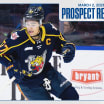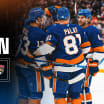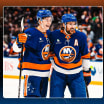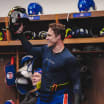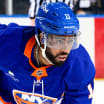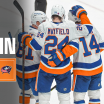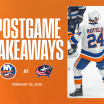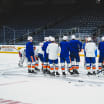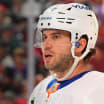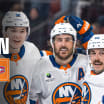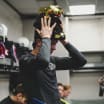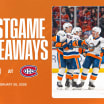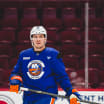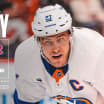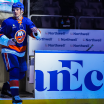Watching a sophisticated telecast of Islanders games these days is an eye-opener for me.
I'm enthralled with the remarkable camerawork -- uncanny, really -- the Brendan Burke-Butch Goring teamwork, the amiable tete-a-tetes among our charming Shannon Hogan and her guests. Really, it's all a big treat.
But I'll bet that few -- if any -- of you can imagine how Islanders telecasts began in the first place and how The Maven backed into the original gig.
Maven's Memories: The Early Days of Islanders TV
Stan Fischler recalls the early days of Islanders broadcasts
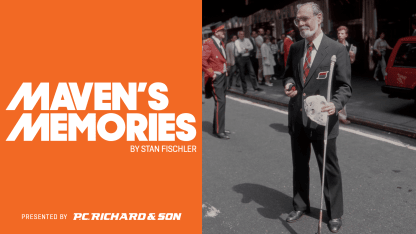
By
Stan Fischler
Special to NHL.com
For starters, you have to remember that the Islanders were not exactly a hot item in the first two years of the franchise's existence. Bill Torrey was building for the future and just about everybody agreed that it would take time.
Actually the turnabout took only three seasons and by 1974-75, the Al Arbour-coached club was in the process of making a realistic run for the playoffs.
As a hockey journalist, I was viewing the team from up close and afar. The upclose part involved going to games at Nassau Veterans' Memorial Coliseum and writing magazine and other stories about them for various publications.
The afar aspect involved something relatively new for me -- television. In both the 1973-74 and 1974-75,seasons I was doing color commentary for the World Hockey Association's New England Whalers.
I have to admit that I wasn't very good at it, but it was a job and -- more importantly -- it was hockey work. And that meant staying in touch with my many NHL and tv contacts accumulated along the way
One of them was Marty Glickman who -- at the time -- was acknowledged as "The dean of Met Area sportscasters." Marty had done just about everything from hockey, basketball, Brooklyn Dodgers baseball as well as football Giants radio broadcasts.
This was March 1975 and I was napping in Toronto's Royal York Hotel prior to doing a WHA Whalers-Toronto Toros telecast when the phone rang. It was Marty Glickman with whom I'd been in touch from time to time.
"How would you like to do an Islanders game on television?" Glickman asked once we had dispensed with the pleasantries.
Frankly, I was taken aback. And before I could ask any questions, Marty went on with his explanation and pointed out that the team I'd be covering would be none other than the islanders.
More to the issue, he listed a home game with the Atlanta Flames as the match he had in mind. "And by the way," Glickman added, "you'll be working with Spencer Ross. He'll do the play-by-play and you'll do the 'color.'"
Who could say no? I had two seasons of tv under my belt and had developed a bit of a style although not close to winning an Emmy nor Foster Hewitt award.
I had known Ross as a highly-competent sportscaster who could swing from hockey to basketball -- and back -- with consummate ease.
Frankly, if Marty had mentioned anyone else involved in the broadcast -- a producer, perhaps, maybe even a techie or two -- it has escaped me over the 47 years; mostly because we worked with the barest minimum of help.
What I do remember is that we not only survived the night but the Isles went on to clinch a playoff berth and then knocked off the Rangers and Penguins in startling fashion.
"Just beating the Rangers in a playoff was -- for us -- just like winning the Stanley Cup," said Glenn (Chico) Resch who was fast becoming Nassau's national hero.
As the playoffs unfolded, Ross and I learned that we would do only the postseason home games and that didn't bother us at all.
After falling behind to the Penguins -- three games to nothing -- the suddenly charismatic Isles captured the next one, two, three and four games.
An inside look at the details included at the Stan Fischler Press Level. pic.twitter.com/qhwfZiVZw1
— New York Islanders (@NYIslanders) October 26, 2022
Until that spring only one other team in NHL history -- the 1942 Toronto Maple Leafs -- had accomplished that four-straight feat. What's more, the Isles now had reached the third playoff round, facing the defending champion Flyers.
Once again, our guys rebounded from a 0-3 deficit and actually tied the series at three wins apiece. Or, as Spencer put it, "This is un-real."
Unfortunately, since the game was at Philly's Spectrum, we didn't get to do the clincher. But we did get good news.
"If all goes well," Glickman told us, "you'll be doing all the Islanders games next season."
All did go well. Chuck Dolan had hit a home run with his cable television company and -- as a result of their fabulous postseason -- the Isles had become a sizzling item.
Of course, Ross and I -- we'd become close friends as well as tv colleagues -- had no idea where this Islanders tv project was heading.
What we learned was that our tv team would progress in the same direction as the Islanders and that their 1975-76 season would move us up, up and Away.
As the "color" commentator, I also doubled as between periods interviewer and now I had real stars to schmooze with including down-the-road Hall of Famers such as Denis Potvin, Bill Smith and Clark Gillies, for starters.
The affable Gillies was an early favorite among my interviews. Asked what he thought about the (75-76) season ahead -- based on the playoff accomplishments -- Jethro shot back: "I guess all we can do for an encore is win the Stanley Cup!"
As for our telecasts, all we could do for an encore was refine our shows and that always wasn't easy. The Coliseum designers had never installed an interview room so I was forced to conduct my one-on-ones at our camera location up in the press box.
"You're not going to get too many players to come up here to do an interview in their skates," kidded Ross, "so you'll have to do the next best thing."
Instead of players in uniform, I'd locate one of the 'Scratches" or, perhaps, a hockey writer. One of my favorites was Sid Payne of the (now defunct) Long Island Press. At the time, Payne was one of the best reporters covering the team and always came through with useful insights.
And since he didn't wear skates, GM Bill Torrey inevitably was a terrific interview. It was Bow Tie Bill who picked Al Arbour -- over at least two other solid choices, Johnny Wilson and John McLellan -- to coach his Isles.
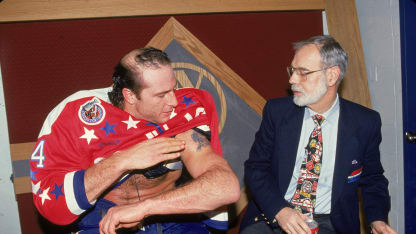
© Getty Images
One of Torrey's most insightful observations about Radar Al was this: "Al's biggest attribute is the way he gives young players confidence in themselves. We draft them and Al molds them.
"A kid will have to goof up pretty badly over an extended period of time before Al will pull him. Nothing shatters a youngster's confidence more quickly than being benched for a bad shift. Al will tell him what he's doing wrong on the ice and then stick him right back out for the next shift."
Coincidentally, the same approach was taken with our telecasts. Marty Glickman, who brought me on to the broadcast team in the first place, was Chuck Dolan's consultant and Marty would hold "Get Better Sessions" with us.
Mind you this still was the primitive era when video replay was in its infancy and a lot of what Glickman taught us simply was by word of mouth, based on Marty's long experience in the broadcast business.
The more the Islanders won in 75-76, the more the Ross-Fischler combine improved. At season's end, our Nassaumen had 101 points and another playoff berth.
Better still, the Arbourmen knocked off Vancouver and Buffalo in the first two postseason rounds. Actually, the only downer -- if you could call it that -- was the fact that our third round foe happened to be the Canadiens.
The bad news was that the Isles only won once, 5-2, in the best-of-seven series. The good news was that our skaters were better than Chicago and Philadelphia who couldn't even win a game against the soon-to-be-Cup champs.
And, for me, the even better news came via my new producer, Stan Epstein, who uttered the delicious words I had hoped for all season.
"Next season, Stan," he promised, "you'll have your own studio!"
It was the best gift I'd received since my bar mitzvah!


